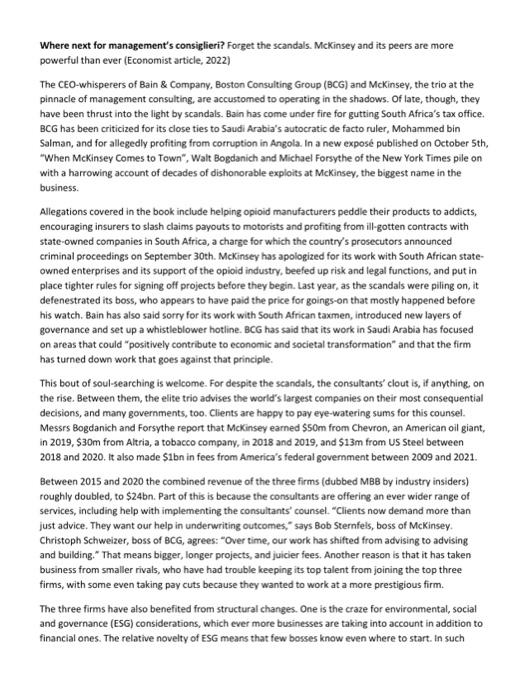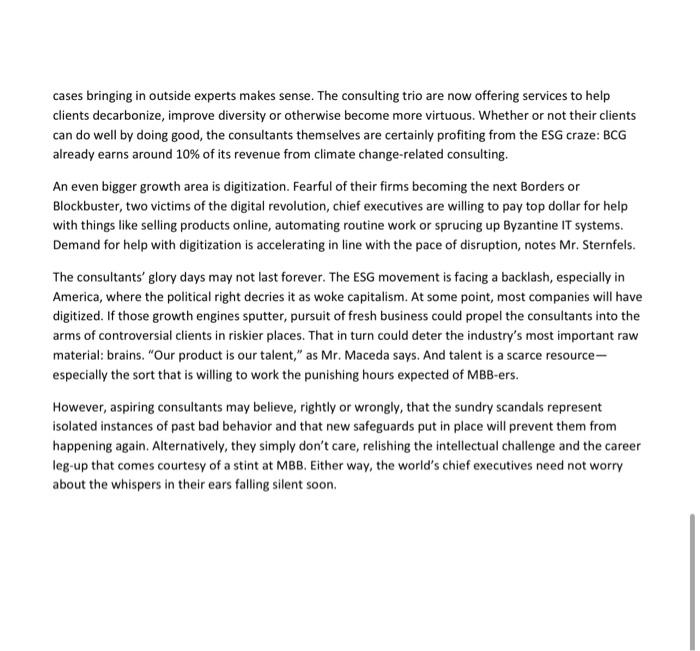Where next for management's consiglieri? Forget the scandals. Mckinsey and its peers are more powerful than ever (Economist article, 2022) The CEO-whisperers of Bain \& Company, Boston Consulting Group (BCG) and McKinsey, the trio at the pinnacle of management consulting, are accustomed to operating in the shadows. Of late, though, they have been thrust into the light by scandals. Bain has come under fire for gutting South Africa's tax office. BCG has been criticized for its close ties to Saudi Arabia's autocratic de facto ruler, Mohammed bin Salman, and for allegedly profiting from corruption in Angola. In a new expos published on October 5 th. "When Mckinsey Comes to Town", Walt Bogdanich and Michael Forsythe of the New York Times pile on with a harrowing account of decades of dishonorable exploits at Mckinsey, the biggest name in the business. Allegations covered in the book include helping opioid manufacturers peddle their products to addicts, encouraging insurers to slash claims payouts to motorists and profiting from ill-gotten contracts with state-owned companies in South Africa, a charge for which the country's prosecutors announced criminal proceedings on September 30th. Mckinsey has apologized for its work with South African stateowned enterprises and its support of the opioid industry, beefed up risk and legal functions, and put in place tighter rules for signing off projects before they begin. Last year, as the scandals were piling on, it defenestrated its boss, who appears to have paid the price for goings-on that mostly happened before his watch. Bain has also said sorry for its work with South African taxmen, introduced new layers of governance and set up a whistleblower hotline. BCG has said that its work in Saudi Arabia has focused on areas that could "positively contribute to economic and societal transformation" and that the firm has turned down work that goes against that principle. This bout of soul-searching is welcome. For despite the scandals, the consultants' clout is, if anything, on the rise. Between them, the elite trio advises the world's largest companies on their most consequential decisions, and many governments, too. Clients are happy to pay eye-watering sums for this counsel. Messrs Bogdanich and Forsythe report that Mckinsey earned $50m from Chevron, an American oil giant. in 2019, \$30m from Altria, a tobacco company, in 2018 and 2019, and $13m from US Steel between 2018 and 2020. It also made $1 bn in fees from America's federal govemment between 2009 and 2021. Between 2015 and 2020 the combined revenue of the three firms (dubbed MBB by industry insiders) roughly doubled, to $24bn. Part of this is because the consultants are offering an ever wider range of services, including help with implementing the consultants' counsel. "Clients now demand more than just advice. They want our help in underwriting outcomes," says Bob Sternfels, boss of McKinsey. Christoph Schweizer, boss of BCG, agrees: "Over time, our work has shifted from advising to advising and building." That means bigger, longer projects, and juicier fees. Another reason is that it has taken business from smaller rivals, who have had trouble keeping its top talent from joining the top three firms, with some even taking pay cuts because they wanted to work at a more prestigious firm. The three firms have also benefited from structural changes. One is the craze for environmental, social and governance (ESG) considerations, which ever more businesses are taking into account in addition to financial ones. The relative novelty of ESG means that few bosses know even where to start. In such cases bringing in outside experts makes sense. The consulting trio are now offering services to help clients decarbonize, improve diversity or otherwise become more virtuous. Whether or not their clients can do well by doing good, the consultants themselves are certainly profiting from the ESG craze: BCG already earns around 10% of its revenue from climate change-related consulting. An even bigger growth area is digitization. Fearful of their firms becoming the next Borders or Blockbuster, two victims of the digital revolution, chief executives are willing to pay top dollar for help with things like selling products online, automating routine work or sprucing up Byzantine IT systems. Demand for help with digitization is accelerating in line with the pace of disruption, notes Mr. Sternfels. The consultants' glory days may not last forever. The ESG movement is facing a backlash, especially in America, where the political right decries it as woke capitalism. At some point, most companies will have digitized. If those growth engines sputter, pursuit of fresh business could propel the consultants into the arms of controversial clients in riskier places. That in turn could deter the industry's most important raw material: brains. "Our product is our talent," as Mr. Maceda says. And talent is a scarce resourceespecially the sort that is willing to work the punishing hours expected of MBB-ers. However, aspiring consultants may believe, rightly or wrongly, that the sundry scandals represent isolated instances of past bad behavior and that new safeguards put in place will prevent them from happening again. Alternatively, they simply don't care, relishing the intellectual challenge and the career leg-up that comes courtesy of a stint at MBB. Either way, the world's chief executives need not worry about the whispers in their ears falling silent soon. Q22 to Q24 are based on the article "Where next for management's consiglieri" The wider range of services offered by the big consultancies is most related to which of the following concepts Co-branding Reputation Distribution channels Product max Question 23 1 pts Q22 to Q24 are based on the article Where next for management's consiglien'" The end of paragraph 4 ("Between 2015 and 2020") suggests that MBB firms are beating their rivals by exploiting which of the following concepts Policy choice Differentiation based on links Differential access to low-cost inpus Economies of scale Question 24 1 pts Q22 to Q24 are bosed on the article Where next for management's consiglien" Paragraph 6 ("An even bigger growth area") suggests that consultancies are helping firms with which of the following sources of low cost Operations Learning Economies of scale Diferential sccess to low cost inputs Policy choices









